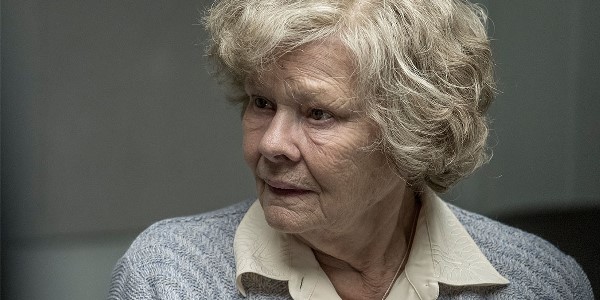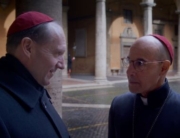As Red Joan opens, elderly widow Joan Stanley (Judi Dench) is enjoying a quiet suburban retirement, puttering about in her garden and drinking tea, when she is abruptly arrested by two Special Branch officers and taken in for questioning on possible charges of treason. A foreign service officer suspected of spying for the Soviets has recently died, and Joan’s name has come up in the course of the investigation of his death.
As she claims her innocence, the film flashes back to 1938 when Joan (played by an appealing Sophie Cookson) is a young physics student at Cambridge University. Naïve and inexperienced, Joan is bedazzled by sophisticated Sonja, a Russian Jewish émigré (Tereza Szbova), and her sexy cousin Leo (Tom Hughes), who entice her to come to their communist meetings where they watch Sergey Eisenstein’s brilliant agitprop Battleship Potemkin. Joan and Leo soon become lovers (and he calls her “my little comrade”).
When World War II breaks out, Joan is recruited to assist Professor Max Davies (Stephen Campbell Moore) on a secret British equivalent of the Manhattan Project, and soon her old comrades are asking her to slip them information about the project. Joan repeatedly resists their requests, while embarking on an affair with her married boss. It is only when she sees the devastation wrought by the bombings of Hiroshima and Nagasaki that Joan decides to pass on her country’s atomic secrets to the Soviets in the hopes that both powers having “the bomb” would prevent them from annihilating each other
Like the rest of this listless movie, Joan’s motivation for spying is never clearly nor convincingly articulated. A major problem is Lindsay Shapero’s muddled script, adapted from Jennie Rooney’s 2013 novel, which in turn was inspired by the real case of “granny spy” Melita Norwood. For a spy movie, there is not much suspense. In the dull interrogation scenes, Dench is not given much to do except look befuddled and blush coyly as she remembers the lovemaking of her youth. Other fine actors, like Ben Miles, who plays her son, are stymied by the clichéd dialogue.
The shift in tone from a moral dilemma (Will Joan betray her country to save the world?) to romantic soap opera (Joan must rescue her married lover from prison) is clunky and jarring. Like most British period pieces, the film’s production design (by Christina Casali) and costumes (Charlotte Walter) are appropriately authentic, but, really, can the Brits find a fresh historical era to explore?
Given the prestigious pedigrees of its Oscar-winning star and director Trevor Nunn, Red Joan is a major disappointment. A shame, because Norwood’s real story is so fascinating. Exposed in 1999, she had been passing information to the Soviets for more than 40 years while living a quiet English life. What kind of dark comedy could a brilliant screenwriter make out of that historical fact?







Leave A Comment